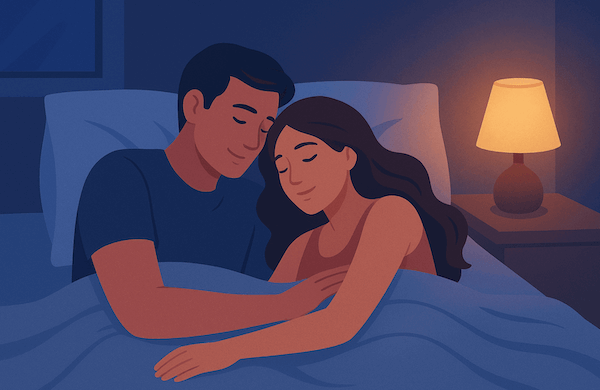The Effect of Intimacy Before Sleep — Is It Good or Bad for Your Sleep?
Introduction
It's one of the most common nighttime questions couples quietly ask:
"Does sex before sleep actually help you rest — or does it keep you awake?"
For decades, popular culture has portrayed sex as a natural sleep aid, while others warn it may energize the body and delay rest. Modern research suggests that the answer depends on timing, emotional connection, and hormonal response.
In this article, we explore how sexual activity affects the body's sleep systems, when it helps, when it hurts, and how to align intimacy with your sleep health goals.
1. The Science of Intimacy and Sleep
During sexual activity — especially orgasm — the body releases a surge of oxytocin, prolactin, and endorphins, while levels of the stress hormone cortisol decline.
These hormonal changes create a physiological state remarkably similar to the early stages of sleep. Heart rate slows, muscles relax, and a wave of calm spreads through the nervous system.
A study published in the Journal of Sexual Medicine (2023) found that adults who reported sexual activity before bed experienced 14–25% better subjective sleep quality than those who abstained.
2. Why It Helps You Sleep Better
a. Oxytocin: The "Bonding Hormone"
Often called the "cuddle hormone," oxytocin promotes feelings of closeness and emotional safety. It reduces stress and anxiety — two of the biggest barriers to restful sleep.
When released through physical touch, hugging, or sexual intimacy, oxytocin encourages parasympathetic nervous system activity — the "rest and digest" mode.
b. Prolactin and Post-Orgasm Relaxation
After orgasm, prolactin levels spike, inducing a state of deep physical relaxation. This helps explain why many people feel sleepy after sex.
Men, in particular, experience a sharper prolactin response, but women also benefit from its sedative effects — especially when paired with emotional intimacy.
c. Endorphins: Natural Pain Relievers
Sexual activity releases endorphins, which can ease mild pain and tension. This physical comfort contributes to falling asleep faster and staying asleep longer.
3. When Sex Might Hurt Your Sleep
While intimacy can enhance sleep, not all pre-sleep encounters are equal.
Several factors can make sex stimulating rather than soothing:
- Rushed or stressful encounters can elevate cortisol rather than reduce it.
- Intense physical exertion, especially right before bed, can raise heart rate and body temperature — delaying sleep onset.
- Screen-based stimulation (watching adult content) reintroduces blue light and artificial dopamine triggers that interfere with melatonin production.
In other words, it's not the act itself that matters most, but the emotional and physical context.
4. Emotional Connection Matters
Research consistently shows that emotionally connected sex provides stronger sleep benefits than casual or transactional experiences.
Couples who report higher relationship satisfaction also report fewer instances of insomnia and nighttime awakenings, according to the Sleep and Health Journal (2024).
Why? Emotional intimacy enhances oxytocin release and stabilizes the nervous system, helping both partners relax into synchronized sleep cycles.
5. The Role of Gender and Hormones
Men and women may experience different physiological responses:
| Gender | Dominant Sleep-Related Hormone | Typical Effect After Sex |
|---|---|---|
| Men | Prolactin | Rapid relaxation and drowsiness |
| Women | Oxytocin and estrogen | Reduced stress, emotional calm |
| Both | Endorphins | Pain relief, improved mood, better sleep onset |
These differences help explain why many couples find post-intimacy sleep preferences vary — and why understanding your partner's rhythm can improve mutual rest.
6. Timing and Frequency: Finding the Sweet Spot
Having sex right before bed is not always ideal, especially after intense activity. Allow at least 15–20 minutes of quiet recovery time to let heart rate and body temperature return to normal.
Consistency also matters. Studies suggest that couples who maintain regular, satisfying intimacy experience lower rates of chronic sleep disruption.
As one 2024 clinical review noted:
"Sexual activity serves as a natural regulator of sleep–wake cycles when integrated into a stable bedtime routine."
7. When to Avoid Sex Before Sleep
There are a few scenarios where pre-sleep intimacy might interfere with rest:
- After alcohol or heavy meals: Both can cause bloating and dehydration, which disrupt sleep cycles.
- During high stress periods: The body's cortisol levels may override oxytocin's calming effects.
- When it leads to emotional tension: Arguments or unresolved conflict afterward can increase anxiety and insomnia.
In such cases, it's better to choose non-sexual physical affection, like cuddling, massage, or gentle touch, which still triggers relaxation hormones without overstimulation.
8. Alternatives for Better Sleep Together
Even without intercourse, intimate rituals can strengthen connection and prepare the body for sleep:
- Share gratitude or positive reflections before bed.
- Try partner breathing — inhaling and exhaling in sync for two minutes.
- Practice light massage or skin-to-skin contact to trigger oxytocin naturally.
These small moments of closeness help the body transition from alertness to calmness — a foundation for restorative sleep.
Conclusion
So, is sex before sleep good or bad?
In most cases, it's good — very good.
When approached with care, connection, and timing, intimacy serves as one of nature's most effective (and enjoyable) sleep aids. The key is to avoid rushing, stress, and artificial stimulation.
Healthy intimacy strengthens relationships and supports the neurochemical balance needed for deep, rejuvenating rest. In essence, loving well and sleeping well go hand in hand.
References
- Journal of Sexual Medicine. "Sexual Activity and Sleep Quality." (2023)
- Sleep and Health Journal. "Relationship Satisfaction and Sleep Outcomes." (2024)
- National Sleep Foundation. "How Oxytocin Affects Sleep." (2023)
- American Psychological Association. "Stress, Intimacy, and Sleep Quality." (2024)
Related Articles
- Pre-Sleep Habits That Seriously Affect Sleep Quality
- Diet and Sleep: Foods That Help You Sleep Better
- Sleep and Mental Health: How Good Sleep Improves Your Mood

